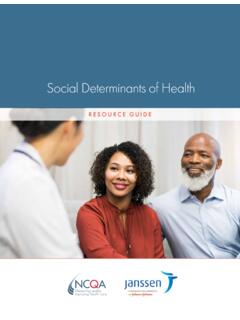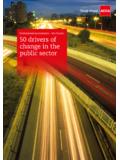Transcription of AN EQUITABLE WATER FUTURE Opportunities for the Great ...
1 AN EQUITABLE WATER FUTUREO pportunities for the Great Lakes RegionAn EQUITABLE WATER FUTURE : Opportunities for the Great Lakes Region 1 PREFACEIn the summer of 2017, the US WATER alliance released An EQUITABLE WATER FUTURE : A National Briefing Paper, the most comprehensive document to date on the intercon nections between WATER management and equity in the United States. Since its release, we have been encouraged by the enthusiastic response from a range of stake holders WATER utilities, community based organizations, journalists, elected officials, universities, and more.
2 It s clear that communities across the nation recognize the importance of EQUITABLE WATER management, and they are taking bold strides to implement it. The national briefing paper had a particular resonance in the Great Lakes region. As a place that is rich in WATER resources, and also the location of some of the most serious WATER crises in recent American history, the Great Lakes region exemplifies the challenges and Opportunities inherent in our WATER systems. It is also home to inspiring leaders in the movement for social and economic equity. This report highlights the strategies being developed in the Great Lakes to ensure that our WATER systems provide services and opportunity to all people, and creates a shared vision for the region s FUTURE .
3 The Great Lakes regional identity, history, and culture have been shaped by WATER . It is home to creative, diverse, and innovative leaders who are shifting the course of the region s FUTURE to be more EQUITABLE . The US WATER alliance has produced this report to support and scale up their promising work. By working in partnership, we can build an EQUITABLE WATER FUTURE for the Great WATER , One ShaferExecutive Director, Milwaukee Metropolitan Sewerage District; Board Chair, US WATER alliance Radhika FoxChief Executive Officer, US WATER Alliance2 US WATER AllianceThe US WATER alliance is deeply grateful to the Joyce Foundation, Kresge Foundation, and Charles Stewart Mott Foundation for their support of this greatly appreciate Program Manager Zo Roller, the lead researcher and writer of the also thank Megan Demit for her research and writing assistance.
4 The US WATER alliance thanks Great Lakes stake holders who served as reviewers and advisors as we developed this report. For their time and insights we thank: Elin Betanzo, Principal, Safe WATER Engineering, LLC Ann Brummitt, Co Executive Director, Milwaukee WATER Commons Bianca Butts, Manager of Climate Resiliency & Sustainability, Cleveland Neighborhood Progress Elizabeth Cisar, Senior Program Officer, Environment Program, Joyce Foundation Constance Haqq, Director of Administration and External Affairs, Northeast Ohio Regional Sewer District Monica Lewis-Patrick, Co Founder, President, and CEO, We the People of Detroit Ann McCammon-Soltis, Division of Intergovernmental Affairs Director.
5 Great Lakes Indian Fish & Wildlife Commission Matt McKenna, Director of the Great Lakes Washington Program, Northeast Midwest Institute Josina Morita, Commissioner, Metropolitan WATER Reclamation District of Greater Chicago Julie Barrett O Neill, Green Program Director, Buffalo Sewer Authority San Juana Olivares, President and CEO, Genesee County Hispanic Latino Collaborative Sam Passmore, Program Director, Environment Program, Mott Foundation Eric Rothstein, Principal, Galardi Rothstein Group Sridhar Vedachalam, Director, Safe Drinking WATER Research and Policy Program, Northeast Midwest Institute Gina Wammock, President, Lakeview Strategic Services, LLC Jenita Warner, Sustainability Manager, Northeast Ohio Regional Sewer District Jalonne White-Newsome, Senior Program Officer, Kresge FoundationACKNOWLEDGMENTS An EQUITABLE WATER FUTURE .
6 Opportunities for the Great Lakes Region 3 4 INTRODUCTION 9 THE PILLARS OF WATER EQUITY 11 PRIORITIES TO FORGE PROGRESS 30 CONCLUSION 33 NOTES 36 ABOUT THE US WATER ALLIANCECONTENTS 4 US WATER AllianceThe Great Lakes region is defined by WATER . The lakes are an important national resource, holding 90 percent of the country s fresh surface WATER and supplying drinking WATER to more than 48 million people in the US and WATER is the foundation of the region s identity, and is essential to its environmental, social, and cultural fabric. The region s leaders have long understood the value of WATER and have a proven track record of working together to protect and preserve WATER resources.
7 To secure a sustainable and prosperous FUTURE , stakeholders in the Great Lakes region must build upon these shared values and deepen their focus on fostering equity and inclusion in WATER management. Once the industrial and manufacturing center of America, the region has struggled to adapt to the post industrial economy, leaving many cities with high poverty rates and declining Long after the rest of the country has begun to bounce back from the Great Recession, many Great Lakes cities still face widespread unemployment and distressed housing While the region is seeing employment growth in the education, healthcare, logistics, advanced manufacturing,4 and service sectors, this growth has not been enough to alleviate economic inequalities.
8 In part because these growing sectors do not provide the stability and prosperity that manufacturing jobs did in the As the economy changes, the region is also experiencing significant demographic shifts. Diversity is increasing as people of color and immigrants lead population These growing populations are held back from full parti cipation in the economic and social fabric of the region: communities of color and lower income people in the region tend to be concentrated in areas with lower quality infrastructure and environmental challenges. As the Great Lakes region undertakes planning, policy development, and investments to revitalize its economic base, WATER is a cornerstone for FUTURE growth and prosperity.
9 Jobs in economic sectors that depend directly on WATER infrastructure generate $447 billion in wages annually. Almost a quarter of the jobs in the region are in WATER dependent industries such as agriculture, recreation, and Indeed, WATER is a fundamental strength upon which the region can An EQUITABLE WATER FUTURE : Opportunities for the Great Lakes Region 5 Map of the Great Lakes BasinMICHIGANONTARIOQUEBECLake SuperiorLake MichiganLake HuronLake OntarioWISCONSINMINNESOTAILLINOISINDIANA OHIOPENNSYLVANIANEW YORKLake ErieChicagoToledoClevelandMilwaukeeGreen BayBay CitySault Ste.
10 MarieThunder BayDuluthDetroitBuffaloErieTorontoOttawa MontrealKingston6 US WATER AllianceThe Great Lakes region must also focus on equity and inclusion if economic growth is going to be sustainable in the long term. Making sure that disadvantaged commu nities have the opportunity to participate in the economic and social life of the Great Lakes strengthens the whole region. Studies have found that greater economic and racial inclusion stimulates more robust growth,8 as well as the converse racial and economic segregation holds back the whole economy in addition to individuals and EQUITABLE WATER management will not solve the Great Lakes socioeconomic challenges on its own, it is an essential component of FUTURE prosperity.






